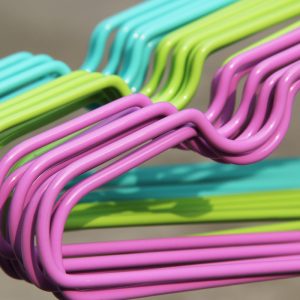What is Thermoplastic Powder Coating

A thermoplastic powder coating melts and flows on the application of heat, but continues to have the same chemical composition when it solidifies on cooling. Thermoplastic powder coating is based on thermoplastic resins of high molecular weight. The properties of these coatings depend on the basic properties of the resin. These tough and resistant resins tend to be difficult, as well as expensive, to be ground into the very fine particles necessary for the spray application and fusing of thin films. Consequently, thermoplastic resin systems are used more as functional coatings of many mils thickness and are applied mainly by the fluidized bed application technique.
Typical examples of thermoplastic powder coatings are:
Polyethylene
Polyethylene powders were the first thermoplastic powder coatings offered to industry. Polyethylene provides coatings of excellent chemical resistance and toughness with outstanding electrical insulation properties. The surface of such applied coatings is smooth, warm to the touch, and of medium gloss. Polyethylene coatings have good release properties, allowing viscous sticky materials to be cleaned from their surfaces. Consequently, they find many uses in the coating of laboratory equipment.
Polypropylene
As a surface coating, polypropylene offers many of the useful properties it has as a plastic material. Because natural polypropylene is so inert, it shows little tendency to adhere to metal or other substrates. This characteristic makes it necessary to chemically modify the natural polypropylene when it is used as a surface coating powder, so that adhesion of the coating to the substrate can be obtained.
Nylon
Nylon powders are almost all based on type 11 nylon resin and offer tough coatings that have excellent abrasion, wear, and impact resistance with a low coefficient of friction when applied over a suitable primer. A most interesting use of nylon powder coating is in the field of mechanical design. Its unique combination of low coefficient of friction and good lubricity makes it ideal for sliding and rotating bearing applications such as automotive spline shafts, relay plungers, and shift forks, and other bearing surfaces on appliances, farm equipment, and textile machinery.
Polyvinyl
Polyvinyl chloride powder coatings have good exterior durability and provide coatings with a medium-soft glossy finish. They bond well to most metal substrates when applied over a suitable primer. These coatings will withstand the stress of metal fabrication operations such as bending, embossing, and drawing.
Thermoplastic Polyester
Thermoplastic polyester powder coatings have good adhesion to most metal substrates without requiring a primer, and exhibit good exterior weatherability. They are good coatings for such items as outdoor metal furniture.
Thermoplastic powders are most suitable for coating items requiring a thicker film for extreme performance. They do not generally compete in the same markets as liquid paints.
